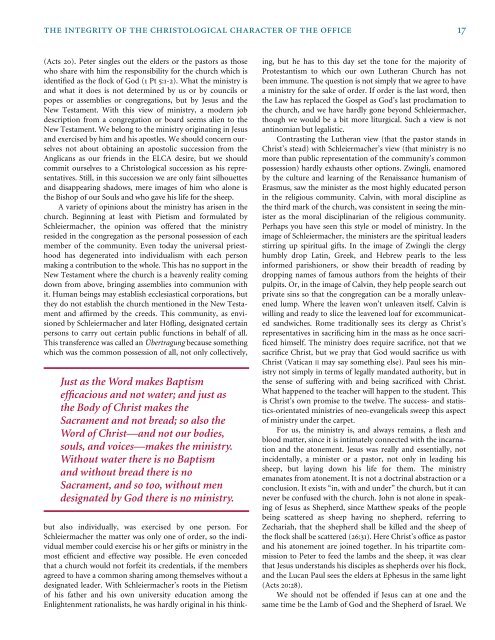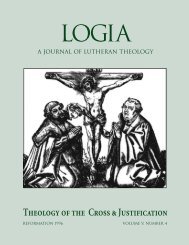You also want an ePaper? Increase the reach of your titles
YUMPU automatically turns print PDFs into web optimized ePapers that Google loves.
the integrity of the christological character of the office 17<br />
(Acts 20). Peter singles out the elders or the pastors as those<br />
who share with him the responsibility for the church which is<br />
identified as the flock of God (1 Pt 5:1-2). What the ministry is<br />
and what it does is not determined by us or by councils or<br />
popes or assemblies or congregations, but by Jesus and the<br />
New Testament. With this view of ministry, a modern job<br />
description from a congregation or board seems alien to the<br />
New Testament. We belong to the ministry originating in Jesus<br />
and exercised by him and his apostles. We should concern ourselves<br />
not about obtaining an apostolic succession from the<br />
Anglicans as our friends in the ELCA desire, but we should<br />
commit ourselves to a Christological succession as his representatives.<br />
Still, in this succession we are only faint silhouettes<br />
and disappearing shadows, mere images of him who alone is<br />
the Bishop of our Souls and who gave his life for the sheep.<br />
A variety of opinions about the ministry has arisen in the<br />
church. Beginning at least with Pietism and formulated by<br />
Schleiermacher, the opinion was offered that the ministry<br />
resided in the congregation as the personal possession of each<br />
member of the community. Even today the universal priesthood<br />
has degenerated into individualism with each person<br />
making a contribution to the whole. This has no support in the<br />
New Testament where the church is a heavenly reality coming<br />
down from above, bringing assemblies into communion with<br />
it. Human beings may establish ecclesiastical corporations, but<br />
they do not establish the church mentioned in the New Testament<br />
and affirmed by the creeds. This community, as envisioned<br />
by Schleiermacher and later Höfling, designated certain<br />
persons to carry out certain public functions in behalf of all.<br />
This transference was called an Übertragung because something<br />
which was the common possession of all, not only collectively,<br />
Just as the Word makes Baptism<br />
efficacious and not water; and just as<br />
the Body of Christ makes the<br />
Sacrament and not bread; so also the<br />
Word of Christ—and not our bodies,<br />
souls, and voices—makes the ministry.<br />
Without water there is no Baptism<br />
and without bread there is no<br />
Sacrament, and so too, without men<br />
designated by God there is no ministry.<br />
but also individually, was exercised by one person. For<br />
Schleiermacher the matter was only one of order, so the individual<br />
member could exercise his or her gifts or ministry in the<br />
most efficient and effective way possible. He even conceded<br />
that a church would not forfeit its credentials, if the members<br />
agreed to have a common sharing among themselves without a<br />
designated leader. With Schleiermacher’s roots in the Pietism<br />
of his father and his own university education among the<br />
Enlightenment rationalists, he was hardly original in his think-<br />
ing, but he has to this day set the tone for the majority of<br />
Protestantism to which our own Lutheran Church has not<br />
been immune. <strong>The</strong> question is not simply that we agree to have<br />
a ministry for the sake of order. If order is the last word, then<br />
the Law has replaced the Gospel as God’s last proclamation to<br />
the church, and we have hardly gone beyond Schleiermacher,<br />
though we would be a bit more liturgical. Such a view is not<br />
antinomian but legalistic.<br />
Contrasting the Lutheran view (that the pastor stands in<br />
Christ’s stead) with Schleiermacher’s view (that ministry is no<br />
more than public representation of the community’s common<br />
possession) hardly exhausts other options. Zwingli, enamored<br />
by the culture and learning of the Renaissance humanism of<br />
Erasmus, saw the minister as the most highly educated person<br />
in the religious community. Calvin, with moral discipline as<br />
the third mark of the church, was consistent in seeing the minister<br />
as the moral disciplinarian of the religious community.<br />
Perhaps you have seen this style or model of ministry. In the<br />
image of Schleiermacher, the ministers are the spiritual leaders<br />
stirring up spiritual gifts. In the image of Zwingli the clergy<br />
humbly drop Latin, Greek, and Hebrew pearls to the less<br />
informed parishioners, or show their breadth of reading by<br />
dropping names of famous authors from the heights of their<br />
pulpits. Or, in the image of Calvin, they help people search out<br />
private sins so that the congregation can be a morally unleavened<br />
lump. Where the leaven won’t unleaven itself, Calvin is<br />
willing and ready to slice the leavened loaf for excommunicated<br />
sandwiches. Rome traditionally sees its clergy as Christ’s<br />
representatives in sacrificing him in the mass as he once sacrificed<br />
himself. <strong>The</strong> ministry does require sacrifice, not that we<br />
sacrifice Christ, but we pray that God would sacrifice us with<br />
Christ (Vatican II may say something else). Paul sees his ministry<br />
not simply in terms of legally mandated authority, but in<br />
the sense of suffering with and being sacrificed with Christ.<br />
What happened to the teacher will happen to the student. This<br />
is Christ’s own promise to the twelve. <strong>The</strong> success- and statistics-orientated<br />
ministries of neo-evangelicals sweep this aspect<br />
of ministry under the carpet.<br />
For us, the ministry is, and always remains, a flesh and<br />
blood matter, since it is intimately connected with the incarnation<br />
and the atonement. Jesus was really and essentially, not<br />
incidentally, a minister or a pastor, not only in leading his<br />
sheep, but laying down his life for them. <strong>The</strong> ministry<br />
emanates from atonement. It is not a doctrinal abstraction or a<br />
conclusion. It exists “in, with and under” the church, but it can<br />
never be confused with the church. John is not alone in speaking<br />
of Jesus as Shepherd, since Matthew speaks of the people<br />
being scattered as sheep having no shepherd, referring to<br />
Zechariah, that the shepherd shall be killed and the sheep of<br />
the flock shall be scattered (26:31). Here Christ’s office as pastor<br />
and his atonement are joined together. In his tripartite commission<br />
to Peter to feed the lambs and the sheep, it was clear<br />
that Jesus understands his disciples as shepherds over his flock,<br />
and the Lucan Paul sees the elders at Ephesus in the same light<br />
(Acts 20:28).<br />
We should not be offended if Jesus can at one and the<br />
same time be the Lamb of God and the Shepherd of Israel. We

















